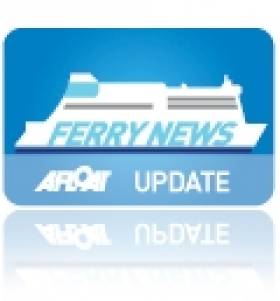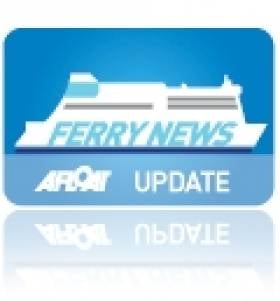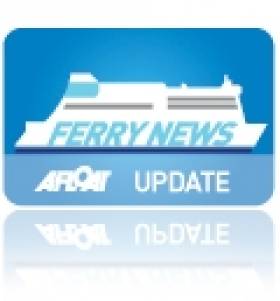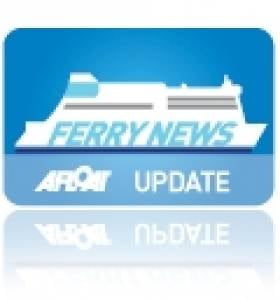Displaying items by tag: Dublin PortHolyhead
‘Superfast’ Sails into Holyhead In Advance of Dublin Port Route Launch
#StenaSuperfast - Stena Superfast X, which is due to make her debut on the Dublin-Holyhead route next week arrived in the Welsh port yesterday, writes Jehan Ashmore.
Her first call to the north Wales port follows a delivery voyage from Gdynia in Poland where she underwent an extensive refit.
Under command of Captain Richard Davies, Stena Line's 30,551 tonnes newcomer arrived at her homeport on Anglesey. It is understood initial berthing trials were made at the jetty.
Stena Superfast X has a capacity for 1,200 passengers and almost 2kms of space for cars and freight vehicles. The 204m long vessel had sailed from the shipyard in Gdynia where work to upgrade passenger facilities and reconfigure vehicle decks were carried out on the 10-deck ferry.
The re-modelling of passenger decks "will be a hint of Scandinavian design" commented Ian Davies, Stena Line Irish Sea Route Manager (South) during a recent interview on BBC Radio Wales.
Among the facilities are free cinema's, catering for adults and for children, while the family lounge will feature X-Box stations for further entertainment. In addition to a premium plus lounge and for freight customers there is a dedicated trucker's lounge.
Launch of the Superfast X next week on the core central Irish Sea route follows the company's decision to withdraw the HSS fast-ferry service on the Dun Laoghaire-Holyhead route. Instead, Stena are to concentrate all existing operations from Dublin Port on the Ireland-Wales link.
The Stena Superfast X will make two round-trips daily, taking 3 hours 15 minutes and will operate alongside Stena Adventurer. The new ferry replaces the smaller Stena Nordica on the route which as previously reported on Afloat.ie, is heading for a new career on the Straits of Dover.
Stena Send in ‘Freight-Only’ Ferry to Replace Damaged Chartered Ferry
#FerryBackUp – Freight ferry Stena Scotia (1996/13,017grt) docked in Dublin Port yesterday for 'berthing trials' and is to provide extra capacity for freight customers next week, writes Jehan Ashmore.
She is a replacement to the damaged chartered ferry Finnarrow, which as previously reported has since reached Scotland, with a tug berthing in Greenock.
The Dutch flagged Stena Scotia (capacity: 114 trailer units) will start freight-sailings next Monday (25 February) to Holyhead, where the 12-driver-accompanied vessel had called en-route yesterday also for berthing trials, having made an overnight passage from Belfast.
It was at the Anglesey port last weekend, where an incident involved the Finnarrow's stabilisers that led to cancelled sailings.
Stena Scotia will run in tandem with ro-pax Stena Adventurer (which takes passengers) on the Dublin route. There will also be additional passenger back-up with fastcraft HSS Stena Explorer sailings on the Dun Laoghaire-Holyhead route.
All passengers are advised to call Stena Line ferrycheck number 08705 755 755, for the most up-to-date information on sailings for 'foot' and those that are 'vehicle-only' by clicking this LINK.
The other regular Dublin route serving ro-pax Stena Nordica is as previously reported on refit cover on the North Channel and is expected to return to service on 19 March.
Stena Scotia (and sister 'Hibernia') had been lying idle in Belfast since September, having been replaced by larger chartered tonnage in the form of newbuild sisters, Stena Performance and Stena Precision.
The pair (from a quartet of newbuilds built last year) operate Stena's Belfast-Heysham freight service, following a short career starting off on the Irish Sea for operators Seatruck.
She has seen a succession of name changes in recent years, as Scotia Seaways under the navy blue colours of DFDS Seaways during a brief entry into the Irish Sea market in 2010.
Before that, she sported the pale blue livery scheme under Maersk / Norfolkline North Sea service as the Maersk Exporter completed in 1996.
Countdown to the Return of the HSS
#FERRY NEWS-A month from today sees the resumption of fast-ferry sailings on the Dun Laoghaire-Holyhead route, operated by Stena Line's HSS Stena Explorer, writes Jehan Ashmore.
The 120 minute central-corridor route closed in mid-September due to consistent high operating costs in recent years. This led to the withdrawal of the fuel-thirsty HSS craft which is powered by four gas-turbine engines.
In addition most of the route's turnover was generated in the high season months, leaving the remaining months unsustainable. As such the company decided to make the service as a seasonal-only operation. To read a previous report of the closure click HERE.
The ending of the year-round-service was the first major break to the route since the introduction of the pioneering HSS Stena Explorer in 1996 which in turn had replaced conventional tonnage. The Finnish built craft was the first of a trio of sisters commissioned for Stena Line and only this vessel remains in service for the operator.
Also operating on the route in recent years was the smaller fast-ferry craft Stena Lynx III which had served several high and low seasons, though she will not be joining her larger fleetmate. The Tasmanian built Incat fastcraft was sold last year to South Korean interests as previously reported on Afloat. ie
Meanwhile the company's Dublin-Holyhead route is maintained by conventional tonnage vessels, Stena Adventurer and Stena Nordica which operate the 3 hour 15 minute service.
Ferry Operator Consider Court Finding
#FERRY NEWS – Senior managers in Stena Line are considering today the implications of a Labour Court recommendation that it increase redundancy terms for 39 workers at its Dún Laoghaire Harbour operation, the Irish Times reports.
The Labour Court rejected the workers' claim for automatic redeployment from the Dún Laoghaire service to Stena's Dublin Port – Holyhead route operation.
Stena's Dublin Port operation is managed by a subcontractor RoRo Services Dublin Ltd, which Stena said had no vacancies.
The ferry company has said the Dún Laoghaire -Holyhead service, which is now seasonal, will reopen in April, as previously reported on Afloat.ie. However, the company told the Labour Court there is currently no work for staff in the south Dublin port.
Workers who are members of SIPTU have been seeking redeployment to Dublin Port or enhanced redundancy payments.
However, while the Labour Court did recommend enhanced redundancy payments, the enhancement is less than that sought by the workers.
In previous redundancies at the company offered three weeks' pay per year of service, inclusive of statutory redundancy. In addition, they had received ex-gratia payments of €18,000 plus an additional €500 per year of service. The Labour Court recommended the €500 per year of service payment should be increased to €1,050 per year of service.
The Labour Court recommended that the company confirm staff in Dún Laoghaire would be given first call on jobs when the Dún Laoghaire service resumes in April.
A Stena spokesperson said senior management at the company were considering the recommendation and would make a statement later in the day.



























































